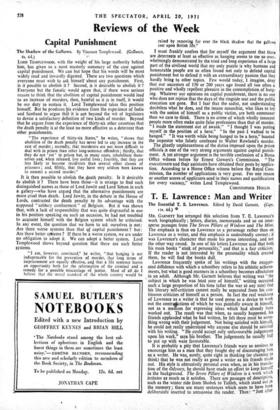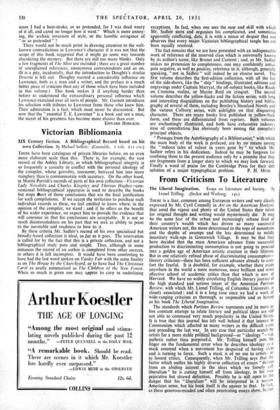T. E. Lawrence : Man and Writer
MR. GARNETT has arranged this selection from T. E. Lawrence's work biographically ; letters, diaries, memoranda and so on inter- sperse passages from The Seven Pillars of Wisdom and The Mint. The emphasis is thus on Lawrence as a personage rather than on Lawrence as a writer, and this emphasis is undoubtedly correct ; it was Lawrence's character that made his prose interesting, and not the other way round. In one of his letters Lawrence said that both his main books " stink of personality," and that is a fair criticism. If the reader is not interested by the personality which created them, he will find the books dull.
Lawrence frequently spoke of his writings with the exagger- ated diffidence with which a schoolboy refers to his athletic achieve- ments, but what is good manners in a schoolboy becomes affectation in an adult. Although Mr. Garnett believes that writing was "the subject in which he was least sure of himself," writing occupied such a large proportion of his time (after the war at any rate) that his literary self-criticism cannot really be separated from his con- tinuous criticism of himself as a person. In fact the real weakness of Lawrence as a writer is that he used prose as a device to work out the contradictions of which he was painfully aware ih himself, not as a medium for expressing ideas which had already been worked out. The result was that when, as usually happened, his friends applauded what he had written, he felt there must be some- thing wrong with their judgement. Not being satisfied with himself, he could not really understand why anyone else should be satisfied with his writing. " He could accept only unfavourable judgements upon his work," says his brother. The judgements he usually had to put up with were favourable. It is probably a pity that Lawrence's friends were so anxious to encourage him as a man that they fought shy of discouraging him as a writer. He was, surely, quite right in thinking (or claiming to think) that he was not really as good a writer as his friends made out. His style is obtrusively personal even when, as in his transla- tion of the Odyssey, he should have made an effort to keep himself in the background. The Seven Pillars of Wisdom is a work which irritates as much as it satisfies. There are passages of description, such as the winter ride from Shobek to Tafileh, which stand out in the memory ; there are many sentenes which seem to have been deliberately inserted to antaeonisc the reader. Thus: "Just after
noon I had a heat-stroke, or so pretended, for I was dead weary of it all, and cared no longer how it went." Which is more annoy- ing, the archaic inversion of style, or the humble arrogance of " or so pretended " ?
There would not be much point in drawing attention to the well- known contradictions in Lawrence's character if it was not that the scope of this book suggested that it might go some way towards elucidating the mystery. But there are still too many blanks. Only a few fragments of The Mint are included ; there are a great number of unexplained references, anonymous correspondents and so on. (It is a pity, incidentally, that the introduction to Doughty's Arabia Deserta is left out. Doughty exerted a considerable influence on Lawrence, both as a man and a writer, and the preface is a much better piece of criticism than any of those which have been included in this volume.) This book makes it if anything harder than before to understand the extraordinary personal influence which Lawrence exercised over all sorts of people. Mr. Garnett introduces his selection with tributes to Lawrence from those who knew him. Their admiration is a fact, which must never be discounted. But now that the " essential T. E. Lawrence " is a book and not a man, the secret of his greatness has become more elusive than ever.
EDWARD HODGKIN.



































 Previous page
Previous page